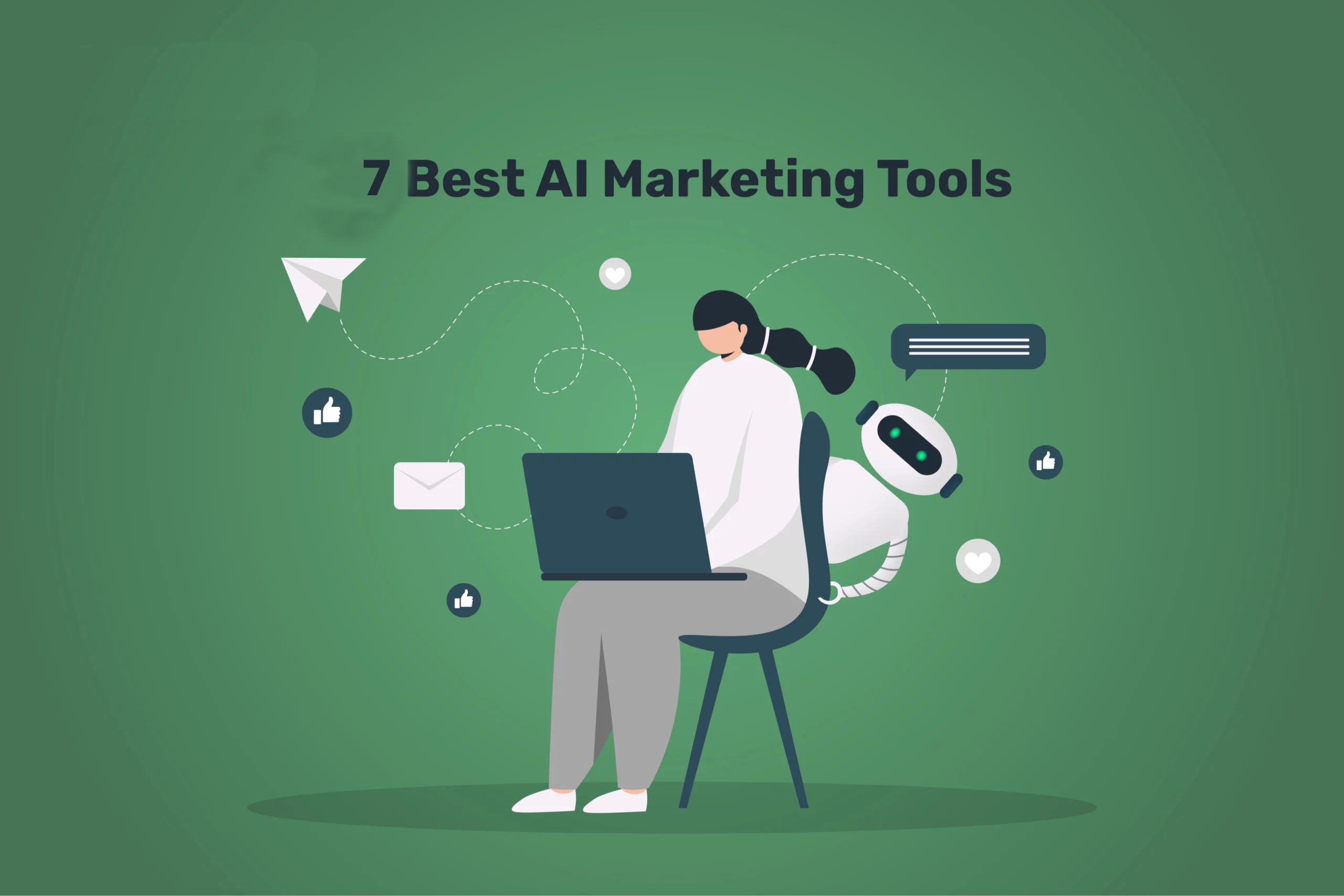Search Engine Optimization (SEO) is the key to getting your website noticed by the right audience. With millions of websites competing for attention, having an effective SEO strategy is critical for success. However, SEO can be complicated and time-consuming. That’s where AI tools come in.
AI-powered tools are revolutionizing how we approach SEO. They analyze vast amounts of data, automate tasks, and provide insights that can help you optimize your website faster and more efficiently. This article will explore the top 7 AI tools for website SEO games to the next level.
What is SEO?
SEO, or search engine optimization, improves your website’s ranking on search engine results pages (SERPs). The higher you rank, the more likely people will visit your site. SEO optimizes your site’s content and technical aspects to drive organic (unpaid) traffic.
SEO is important because search engines like Google are how people find websites. Without good SEO, your site could get lost in the sea of search results. AI tools help simplify SEO by automatically analyzing keywords, optimizing content, and tracking your site’s performance.
Benefits of Using AI Tools for SEO
AI tools for SEO come with numerous advantages. Here are a few reasons why you should consider using them:
- Save time and effort: AI tools can automate many manual SEO tasks, such as keyword research, content analysis, and site audits. This saves you valuable time and reduces effort.
- Data-driven insights: These tools provide accurate, data-backed insights to help you make informed decisions, such as which keywords to target and how to optimize your site.
- Stay updated: SEO trends change quickly. AI tools keep you updated with the latest changes in search algorithms, ensuring your site remains optimized.
Now, let’s dive into the top 7 AI tools to help you succeed in SEO.
Best AI Tools for Website SEO
1: SEMrush
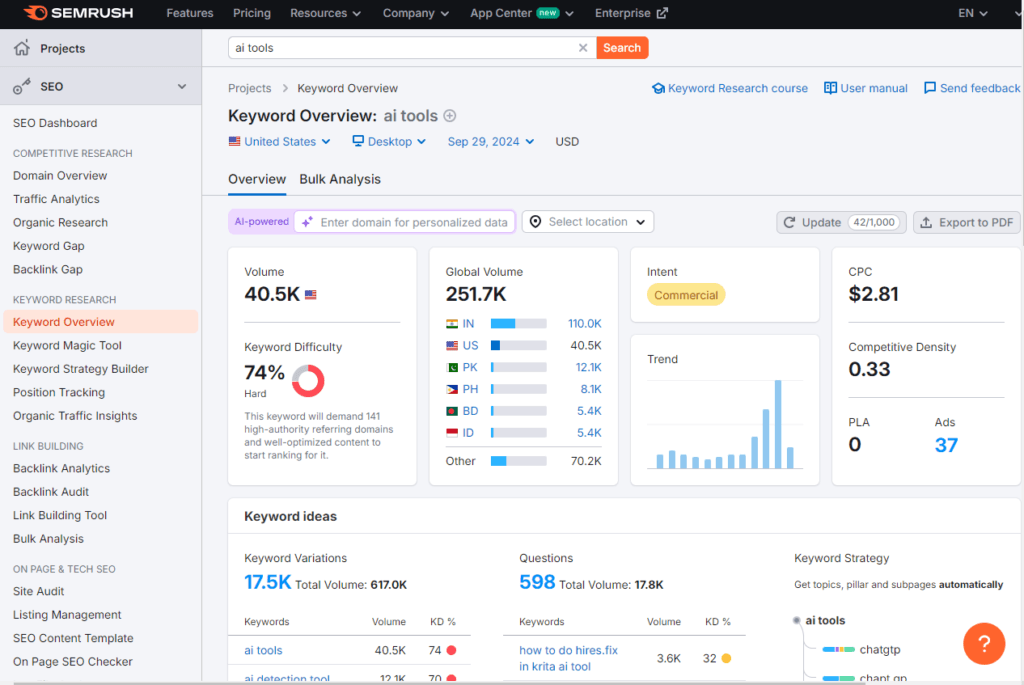
SEMrush is a well-known all-in-one SEO tool that provides comprehensive data on keywords, backlinks, and competitors. It’s especially popular for keyword research and competitor analysis. With SEMrush, you can discover what keywords your competitors are ranking for and use that data to improve your strategy.
How SEMrush helps: It offers insights into keyword difficulty, search volume, and trends. You can also use its site audit feature to find and fix SEO issues on your site.
Pro tip: Use SEMrush’s Keyword Magic Tool to generate keyword ideas and refine your target keywords to match user intent.
2: Ahrefs
Ahrefs is another SEO powerhouse, especially known for its backlink analysis. Backlinks (links from other websites to yours) are an important ranking factor, and Ahrefs gives you detailed information on your backlink profile. It also offers tools for keyword research and content optimization.
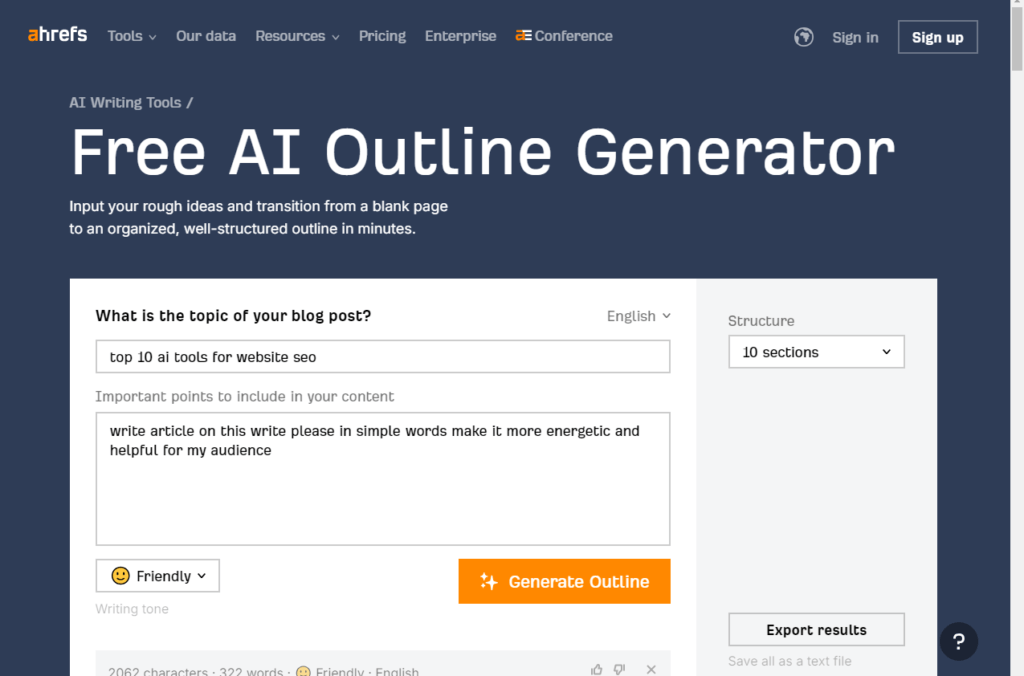
How Ahrefs helps: It allows you to monitor backlinks, see who links to your competitors, and find opportunities to improve your site’s ranking. You can also analyze your site’s performance and track keyword rankings.
Practical example: Use Ahrefs to find broken links on your site or competitor sites. Then, contact the linking pages and ask them to link to your content instead.
3: Moz Pro
Moz Pro is a user-friendly tool perfect for beginners and experienced SEO professionals. It helps you track your website’s rankings, perform site audits, and research keywords. One of Moz’s standout features is its Page Optimization tool, which gives you step-by-step instructions on improving each page on your website.
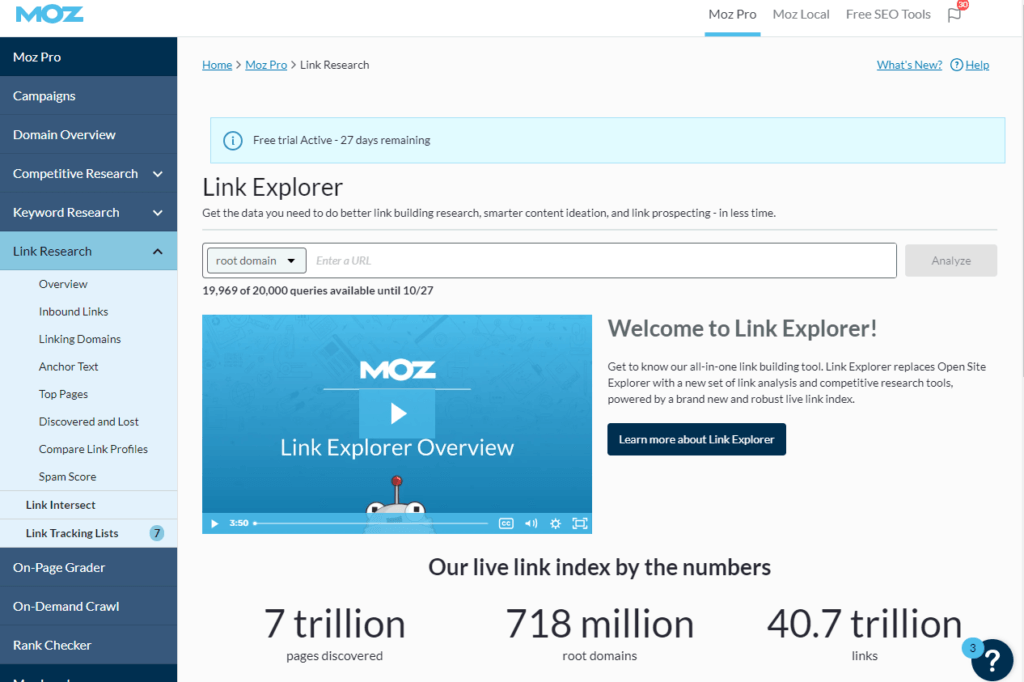
How Moz Pro helps: Moz can help you see how your site is performing over time, spot issues, and make improvements. It also offers many educational resources, making it great for learning SEO as you go.
Strategy for beginners: If you’re starting with Moz, begin with its Keyword Explorer to find keywords with low competition but high search volume. This will give you a quick ranking boost.
4: Surfer SEO
Surfer SEO is unique in that it focuses specifically on on-page optimization. It analyzes the top-ranking pages for any keyword and shows exactly what elements your page needs to rank higher. This includes factors like keyword density, word count, and internal links.
How Surfer SEO helps: It takes the guesswork out of optimizing your content by showing you real-time data on what works for other high-ranking pages.
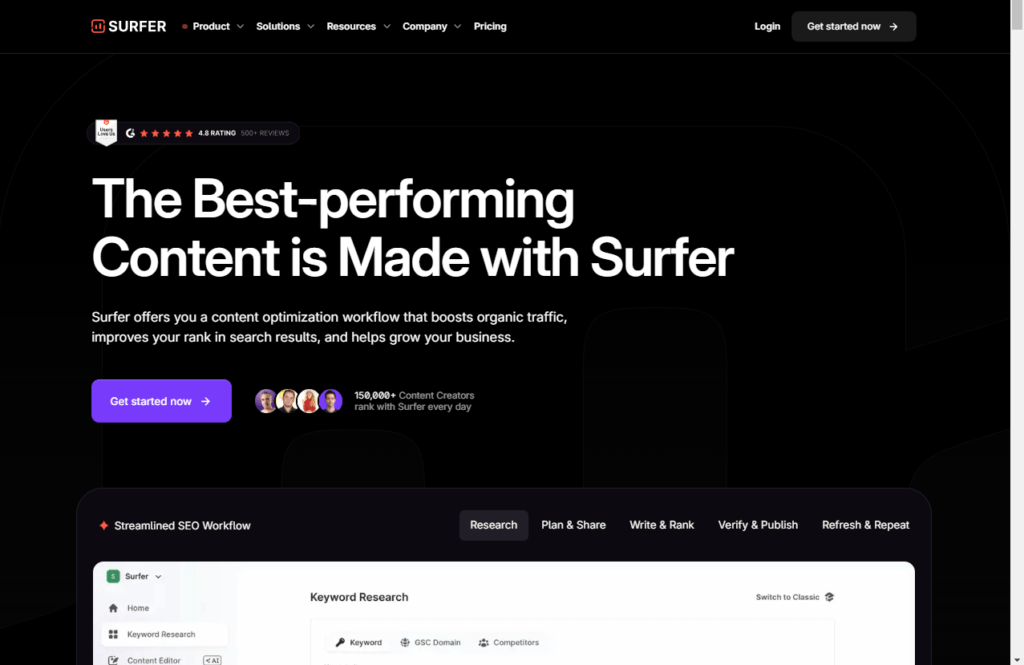
Success story: Many marketers have used Surfer SEO to fine-tune existing content and significantly increase their rankings by following the tool’s recommendations for improving content structure.
5: Clearscope
Clearscope is all about enhancing the quality and relevance of your content. It uses AI to analyze top-performing content and suggests relevant terms to include in your article. By following Clearscope’s recommendations, you can create content that is more likely to rank well and satisfy user intent.
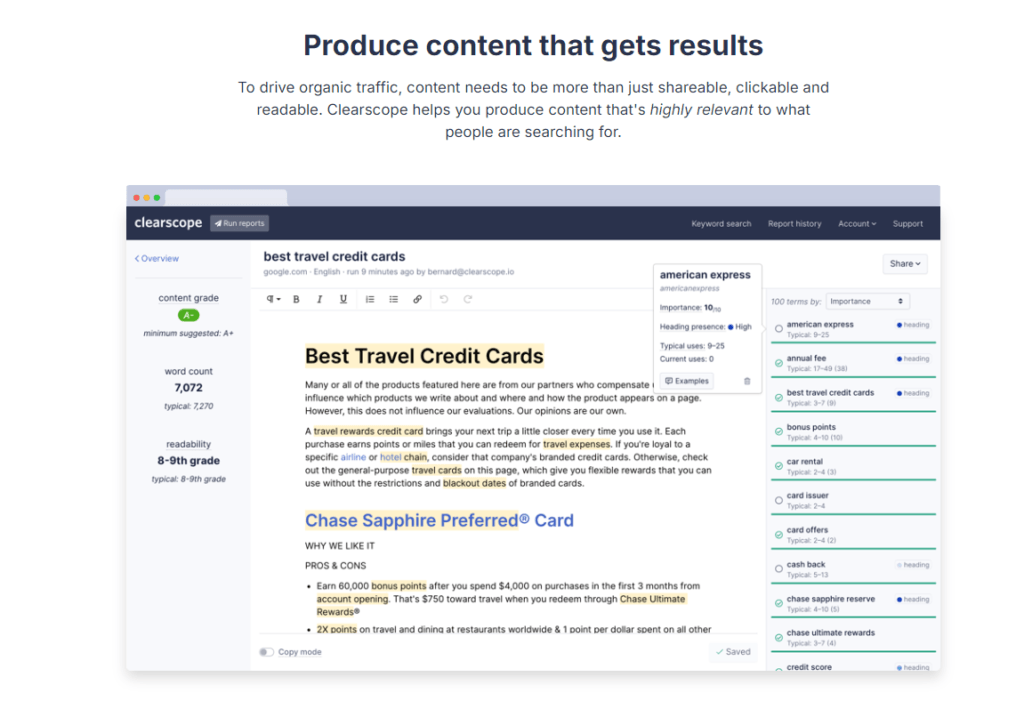
How Clearscope helps: It improves the readability and relevance of your content by guiding you on which terms and phrases to include. This helps make your content more comprehensive and SEO-friendly.
Content creation tip: Use Clearscope while writing your content to ensure you include the right terms that are relevant and helpful to readers.
6: MarketMuse
MarketMuse is an AI-driven content planning tool that helps you create high-quality content by identifying gaps in your existing content. It suggests topics and keywords you should target based on your website’s performance and the competition.
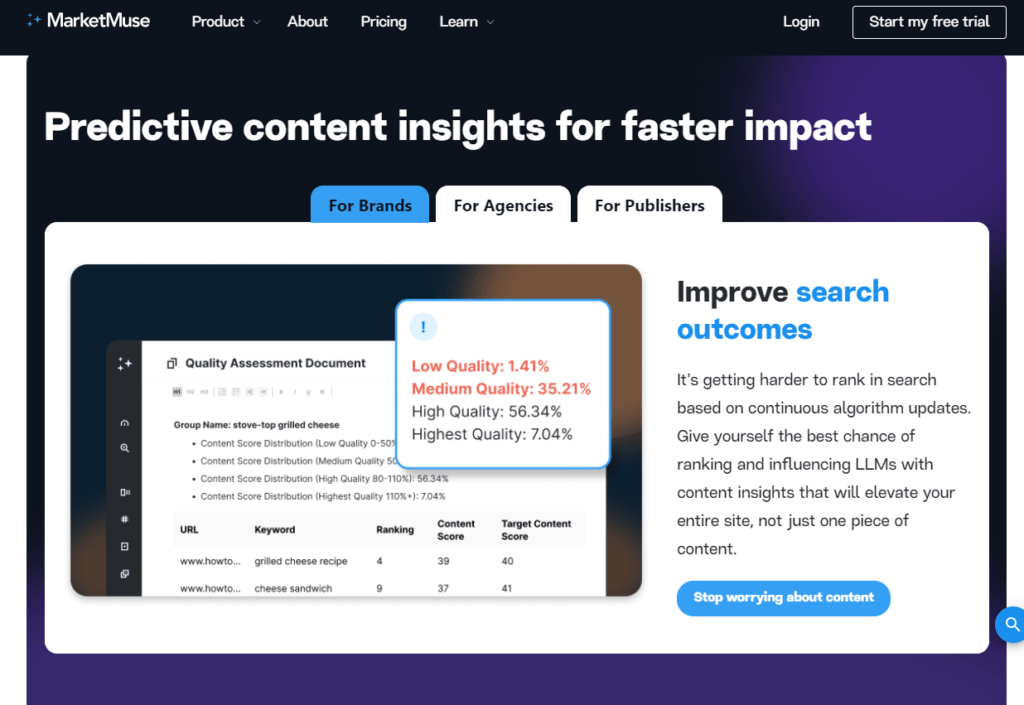
How MarketMuse helps: It provides a clear roadmap for content development, allowing you to prioritize which topics to focus on to increase your chances of ranking higher.
Strategic insight: Use MarketMuse to plan a series of blog posts comprehensively covering a topic. This helps position your website as an authority in your niche.
7: ChatGPT
ChatGPT, powered by OpenAI, is a versatile AI tool that’s making waves in SEO. While it’s commonly known for generating text, it can also be incredibly useful in shaping your SEO strategy. ChatGPT can help you brainstorm content ideas, optimize your existing content, and even assist with technical SEO tasks like generating meta descriptions or FAQs.
How ChatGPT helps: With its ability to understand natural language, ChatGPT can analyze your content, suggest improvements, and even write new sections based on SEO best practices. It’s like having a personal assistant that can instantly generate content and insights, saving you hours of work.
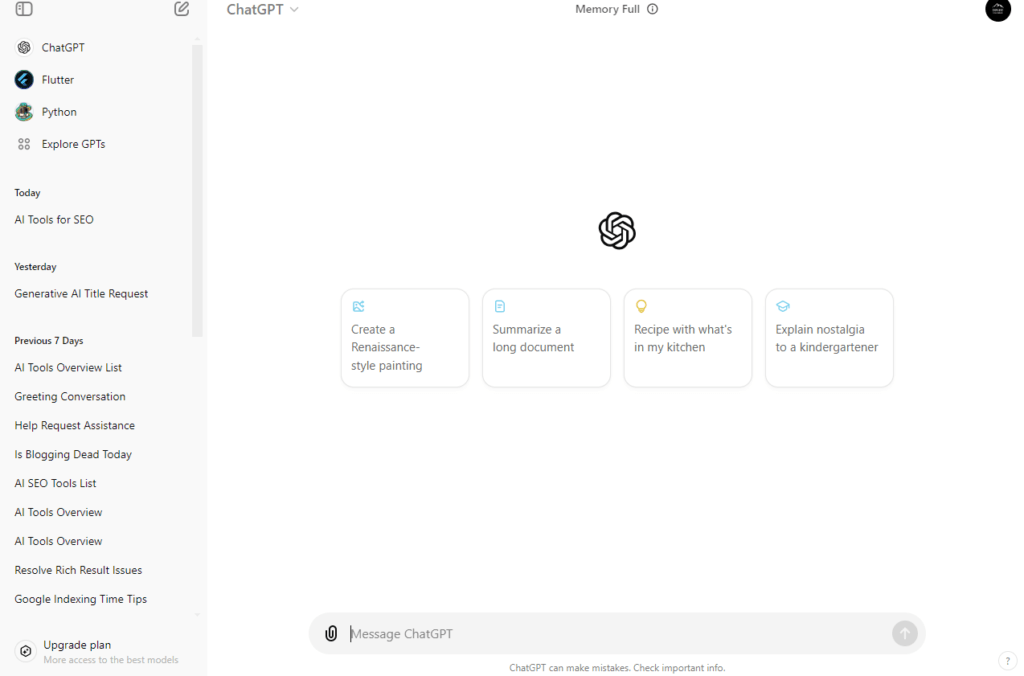
Practical tip: Use ChatGPT to generate variations of your meta descriptions and headings. Test out different versions to see which ones resonate best with your audience and improve click-through rates (CTR).
Conclusion
SEO is essential for driving traffic to your website, and AI tools make it easier, faster, and more effective. Tools like SEMrush, Ahrefs, and Moz Pro provide powerful insights, while others like Surfer SEO and Clearscope focus on improving content quality and on-page optimization. By leveraging these AI-powered SEO tools, you can enhance your website’s performance, stay ahead of the competition, and drive more organic traffic.
If you have not tried these tools, now is the time to explore how they can benefit your website’s SEO. Let us know your experiences and which tools work best for your SEO journey!



